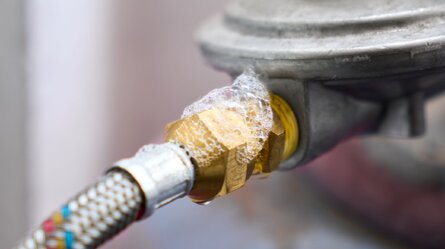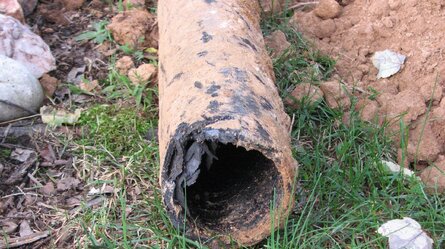Have you ever noticed your water pressure dropping just when you’re elbow deep in suds? Plumbing troubles seem to have a knack for ruining a perfectly good day, whether it’s a persistent drip or water that’s gone dull and lifeless.
Sure, you can fix some issues easily, but when leaks keep coming back, or your taps run murky, or the whole house is experiencing low pressure, it’s a sign your pipes might be aging or failing. This isn’t just annoying—it could mean something more serious is going on.
Repiping your home involves replacing the old plumbing system with brand new pipes—yes, the entire system. While this might sound daunting, consider it an investment in continuous, hassle-free water flow for years. Not only does it enhance water quality and restore pressure, but it also helps prevent future leaks and costly repairs. A little effort now brings a lot of peace later.
Curious if your home should be up for repiping? This blog covers the essential signs to keep an eye on, helping you make informed choices about your home’s plumbing health.
Signs You Need to Repipe Your Home

Ageing Pipes
Every house has a hidden network – its plumbing system. Depending on the material, the pipes that deliver water throughout your home have a typical lifespan. Once commonly used, galvanised steel pipes can last around 40-50 years, while copper pipes can hold strong for 70 years. PEX, a newer option, is estimated to last even longer. However, exceeding these lifespans significantly increases the risk of leaks, bursts, and other problems. Factors like harsh water quality can also accelerate pipe deterioration. If your home approaches or surpasses the expected lifespan of its current pipes, consider proactive repiping to avoid future headaches.
Frequent Leaks
Springing leaks are more than an annoyance – they can be a symptom of a deeper issue. If you’re constantly patching leaks in different areas of your house, it’s a strong indication of widespread pipe deterioration. These leaks not only waste water but can also cause serious water damage and mould growth, posing health risks to your family.
It’s crucial to tell the difference between isolated leaks, which might just need a quick repair, and frequent leaks occurring all over the house. The latter indicates a larger systemic issue that usually calls for repiping.
Low Water Pressure
Picture this: you’re in the shower, ready for that energising blast of water, but all you get is a sad little dribble. If low water pressure is a daily struggle across your home, your pipes might be clogged or corroded. And it’s not just annoying – it slows down everything from dishwashing to laundry, leaving you frustrated and behind schedule
While a faulty faucet could be a culprit in some cases, persistent low pressure often points to problems within the pipes themselves. Ignoring this issue can lead to further deterioration and potential pipe failure. If the problem persists after checking faucets, consider consulting a licensed plumber to investigate the low-pressure source.
Discoloured Water
The crystal-clear water is a sign of a healthy plumbing system. But if your taps dispense rusty or discoloured water, it’s a cause for concern. This discolouration can indicate rust or sediment build-up within the pipes. Consuming rusty water can pose health risks, and laundry washed in discoloured water might end up stained.
While localised issues can sometimes cause discoloured water, if the problem persists throughout the house, repiping is strongly suggested to restore clean, safe water flow.
Odd Noises
Your pipes shouldn’t sound like they’re auditioning for a musical. If you’re hearing knocks, bangs, or rattles every time water flows, it’s likely your plumbing’s way of saying, 'Help!' These sounds often mean water is struggling through damaged or unevenly corroded pipes – and it’s not a problem that’ll fix itself
Not only are these sounds disruptive, but they also indicate potential pipe failure waiting to happen. If you experience strange noises coming from your pipes, don’t ignore them. Schedule a consultation with a licensed plumber to diagnose the issue and determine if repiping is necessary.
Benefits of Repiping Your Home

Improved Water Quality and Safety
Clean, safe drinking water is essential for your family’s health. Repiping your home with new pipes ensures fresh, healthy water flows freely. Older pipes can corrode and leach harmful minerals into your water. Replacing them eliminates this risk, giving you peace of mind knowing your family is consuming clean, contaminant-free water.
Increased Water Pressure
Picture a revitalising shower with strong pressure, or a kitchen sink where rinsing dishes is effortless. Repiping swaps out those weak, clogged pipes for new ones, noticeably enhancing water pressure.
This translates to a more enjoyable showering experience, stronger water flow from taps for everyday tasks, and improved performance from water-using appliances like washing machines and dishwashers.
Reduced Risk of Leaks and Damage
One of the biggest advantages of repiping is the dramatically reduced risk of leaks. New pipes are less susceptible to cracks, corrosion, and bursts than their aged counterparts. This translates to fewer headaches from unexpected leaks, preventing costly water damage and potential mould growth in your home.
Increased Property Value
When selling your house, a modern plumbing system is a valuable asset. Potential buyers appreciate homes with updated features, and a repiped house demonstrates your commitment to maintaining the property. This can be a significant selling point, potentially increasing your home’s value and attracting more interest from buyers.
The Repiping Process
Repiping your home might seem complex, but it can be smooth with the right planning and professional help. Here’s a general idea of what to expect:

1. Planning and Consultation
First, you’ll sit down with a licensed plumber who knows their stuff. They’ll look at your current plumbing, chat with you about your needs and budget, and suggest the best pipe material for the job. Getting the pros involved ensures the book does everything – no shortcuts, no surprises."
2. Choosing the Right Pipes
There are two main options for repiping: copper and PEX. Copper pipes offer excellent durability and longevity but can be more expensive and require skilled installation. PEX tubing, on the other hand, is a flexible and cost-effective option.
It’s easier to install and resistant to corrosion, but it might not be aesthetically pleasing in exposed areas. Your plumber can help you make an informed decision by describing the pros and cons of each material.
3. Creating Access Points
To replace the old pipes, plumbers will need to create strategic access points throughout your house. This might involve cutting drywall in specific areas to reach the existing pipes. An experienced plumber will minimise the number of access points needed and ensure they are placed in discreet locations whenever possible.
4. Installation and Testing
Once the access points are established, the old pipes are removed, and the new pipes are meticulously installed according to the chosen material and layout. Professional plumbers will ensure all connections are secure and watertight. After installation, the entire system undergoes rigorous testing to identify and rectify any leaks before they become a problem.
5. Putting it All Back Together
Following successful testing, the access points are patched and repaired. Your plumber will strive to minimise any disruption caused during the process and leave your house neat and tidy.
Remember: Repiping is significant, so choosing a qualified and experienced plumber is crucial. Don’t hesitate to ask for references and inquire about their experience with repiping projects.
Don’t Wait for a Plumbing Disaster – Repipe for Peace of Mind
Don’t wait for your plumbing to throw a tantrum – take action before things get messy. Neglecting the signs of worn-out pipes can snowball into everything from annoying leaks to expensive water damage (not to mention the health risks). Repiping isn’t just a repair; it’s a long-term investment in clean water, solid pressure, and fewer worries.
If you suspect your home might be due for a repiping, don’t hesitate to contact Woolf Plumbing and Gas. Our experienced plumbers can assess your plumbing system and discuss your options. We offer free consultations and can guide you through the entire repiping process, ensuring a smooth and stress-free experience.




